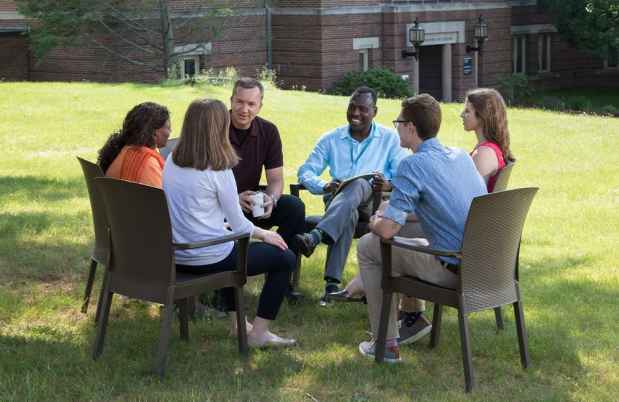Dr. Alisha Moreland-Capuia Leads McLean’s New Culturally Informed Trauma Care Program
July 12, 2021
Psychiatrist Alisha Moreland-Capuia, MD, has been recruited to lead McLean Hospital’s new Program for Culturally and Trauma-Informed Community Outreach.
Moreland-Capuia, an expert in trauma-informed care, specializes in working with underserved populations. She moved from Oregon Health & Science University to join the McLean community this summer.
“All roads lead to trauma, and to the extent that people and systems understand that, is the extent that systems and people can heal,” said Moreland-Capuia. “The goal of the new McLean program is to work with systems and people to do exactly that—understand and heal.
“One part of the program comprises education and training, and the other part is technical coaching. This combination of education, training, and coaching will enable folks to transform their programs, helping them apply a trauma-informed and culturally responsive lens to what they do.”
She said that anyone can be certified as a culturally, trauma-informed agent. A trainee could be a medical professional at a health center or a parent with no formal medical training.
Likewise, any organization can participate, from a small non-profit organization to a Fortune 500 company. Moreland-Capuia was even asked recently to help “develop a trauma-informed Scotland.”
McLean’s new program has already started a collaboration with Roca, an organization that works with justice-involved youth in Massachusetts and Baltimore. Roca helps young men and women “change their behaviors and develop life, education, and employment skills to disrupt the cycles of poverty and incarceration.” McLean’s work with Roca is funded by a generous grant from the Bank of America Foundation.

McLean’s new program, led by Dr. Alisha Moreland-Capuia, will enhance and advance the reach of trauma-informed care
Moreland-Capuia will work with Roca to implement an enhanced model for counseling trauma-affected youth. She will also coach staff and youth as they adapt to this new model.
“We have to reimagine how we work with young people, both in prevention and intervention,” said Moreland-Capuia. “And one way to do this is to improve our understanding of human behavior, brain development, historical trauma, and healing.”
This neuroscience-rich approach will give trainees important scientific context before they set about helping people heal. This includes education on what is necessary for healthy brain development and on concepts such as epigenetics, which has shown that the effects of trauma may be genetically inherited.
Moreland-Capuia said that she is looking for three outcomes for every individual and group that she works with.
“There’s a primary outcome, which is we want to train people,” she said. “The secondary outcome is that we want the training to change a behavior or a practice. And the tertiary outcome is that it improves the care they are rendering to the population they seek to serve.”
She cited her work with the Multnomah County’s Department of Community Justice (DCJ) in Oregon as an example of where changes have led to improvements. Moreland-Capuia said that DCJ staff—parole officers and junior court counselors—were optimistic when they started using a supervision model that worked well in reducing recidivism in Cincinnati, Ohio. But the model didn’t work well in Multnomah County.
Moreland-Capuia explained that the Multnomah clients were primarily young Black males, and the Cincinnati clients were not. She therefore recommended several culturally tailored policy changes.
One such change was to describe supervisees as “justice-involved youth” instead of “young offender” or “criminal” in any paperwork given to youth and their families.
Another change was to start every interaction with clients by asking them whether their basic needs, such as food and shelter, were being met. Moreland-Capuia said that five years after applying these and other changes, recidivism in the youth population treated by the county’s DCJ has decreased significantly.
While she is eager to help organizations to better provide healing, she is similarly eager to prove that trauma-informed care works.
She explained that she wants “people to know what I know.” That is why she will be working closely with McLean’s Kerry J. Ressler, MD, PhD, to study the efficacy of trauma-informed care approaches. Ressler is the chief scientific officer and chief of the Division of Depression and Anxiety Disorders at McLean.
“We want to see what a medical model can do to interrupt the cycles of trauma and violence in our cities,” said Ressler. “Most historical approaches to stopping violence have not taken mental health into account, yet we know the burden of trauma, mental illness, and substance use disorders is huge.”
Moreland-Capuia and Ressler will also test the use of new technologies, such as wearable devices and phone-based apps. They will use these devices to help expand opportunities to provide ongoing coaching, assessment, and intervention.
Moreland-Capuia is excited by the prospect of enhancing and advancing the reach of trauma-informed care.
“My personal life mission is composed of three things: to do good, to serve others, and to reduce human suffering,” she said. “Those things are incredibly important to me, and I believe that this new outreach program at McLean will allow me to do that on a larger scale.”
Media Requests
Journalist or member of the media? We are available 24/7 for media requests.



